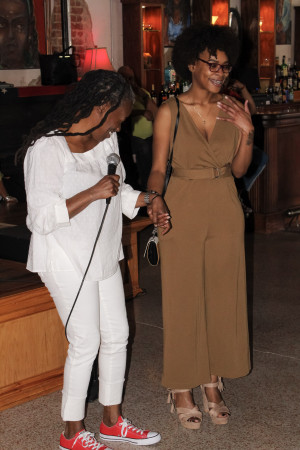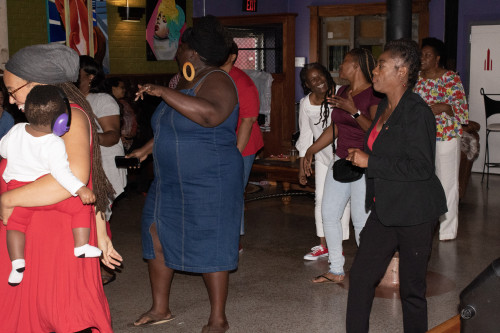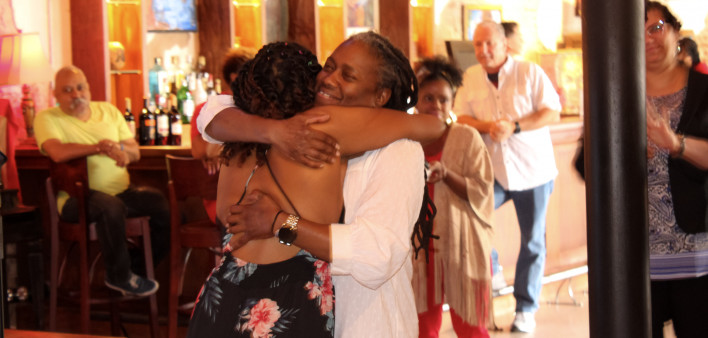Gina Marie Brown was not going to let April 4, 2019, go unacknowledged. “I want women to know that we can celebrate us; we’re still here,” Brown said. “We have nothing to be ashamed of. We have no reason to not get our needs met. We have no reason to not laugh, and love.”
On that day, in 1994, a nurse delivered the words that Brown has repeated countless times in retelling the story of her diagnosis: “You have AIDS and you’re going to die.” Twenty-five years later, an exuberant crowd gathered in Brown’s native New Orleans to celebrate the extraordinary life that has proven that nurse flat wrong.
“It goes back to what we decided when she first was diagnosed: that she was going to live beyond that,” said Brown’s oldest sister, Yolanda B. Hawkins. Hawkins, along with Brown’s aunt, other sister, niece, cousins, daughter, and dozens of community members from across the United States, was in attendance to commemorate Brown’s 25th “seroversary.”

Gina Brown’s sister, Yolanda B. Hawkins (second from right), with their aunt, sister and a cousin.David Armstead
At the time Brown found out she was living with HIV, effective treatment was still several years away. Women were just beginning to be counted as part of the epidemic, the ink still wet on the long-fought-for addition of gender-related diseases to the clinical definition of AIDS by the Centers for Disease Control and Prevention. The study that proved expectant mothers like Brown could have HIV-negative babies was still underway back then.
"For any women who have survived since then to now, that is a real serious story to tell,“ said Dazon Dixon Diallo, founder of Atlanta’s SisterLove, Inc., and a longtime friend of Brown’s. SisterLove convenes the 2020 Leading Women’s Society, of which Brown is a part, which annually inducts and honors 20 women leaders who have been living with HIV for longer than 20 years. ”There are so many women who died never getting a diagnosis, never getting that support, never even being given a chance to know the power of their own story."
Brown’s reception was held at The Building, an elegant music and arts event venue that, like the gathering itself, felt both expansive and intimate. “It felt like family; it felt like community,” Brown marveled. Guests traveled from Baton Rouge, Washington, DC, Atlanta, Houston, and beyond to acknowledge this milestone in the life of a treasured friend, valued colleague, and sister warrior who has touched countless lives as a social worker; pre-Trump-era member of the President’s Advisory Council on HIV/AIDS; longtime organizer and current community engagement manager at the Southern AIDS Coalition; and mentor and “mother” to many advocates living with HIV.
“She really is somebody to everyone,” commented Brown’s daughter, Jamanii Brown. “Being around all the people she’s impacted and hearing story after story after story, it’s overwhelming — but it’s a good overwhelming.” Now nearly 25 and working in the prevention field, Jamanii was born just months after Brown’s diagnosis. “By the time she told me [she was living with HIV], she was genuinely starting to accept it,” Jamanii mused. “I only really remember her as someone who was not ashamed, not fearful.”

Gina Brown brings her daughter, Jamanii, onstage.David Armstead
Between a sumptuous catered lunch featuring creole classics like gumbo, shrimp and grits, and praline cake, and line-dancing to the Wobble and the Biker’s Shuffle, guests listened to Brown speak about 25 women who have touched her life.
“The people you see in this room, this is why I’m here; I didn’t get here on my own,” Brown said. “Some people carried me” — at this point she laughs — “some people dragged me, kicking and screaming!”
Brown presented each woman she honored with a commemorative glass emblazoned with their name, and shared an anecdote suffused with genuine admiration and gratitude. She referred to her sister Pam as her “first friend”; of Tasha, her best friend for the past 50 years, Brown remembered: “I used to see her car and duck into the alley” when she was deep in drug addiction — “because I didn’t want her to be disappointed in me!” She credited Hawkins with teaching her to be self-sufficient, and urged one of her adopted “children,” Tiffany Marrero, to “remember how much you have to offer — and it doesn’t just have to be about HIV.” She said of Jamanii that she has saved her life — “in more ways than you know.” She shared acknowledgement and stories of a past therapist and her doctor; longtime advocacy friends and former employers; her beloved niece who passed away and her partner of nearly six years, Penny DeNoble.
Many who came to celebrate Gina had words for her, as well. “Knowing there were warriors like you in the streets let me know I could take time off and take care of me,” said Hydeia Broadbent — one of Brown’s honorees and “children” whom Brown first encountered on talk shows in the early 1990s, when Broadbent was among the youngest public faces of HIV. When she accepted her glass, Marrero took the opportunity to let Brown know that, when she was ready to step away from HIV advocacy, her children were ready to let her go.
“I loved seeing these different communities show up to support this woman who has influenced them in so many profoundly loving ways,” DeNoble observed. “I was moved to tears when Tiffany gave her permission to sit down: ’We got this; you have taught us and prepared us well,’ is what I was hearing, ’and we will not neglect what you have imparted into us.’”
Brown has talked for many years about eventually bringing her skills and social work training to realms beyond HIV, even mentioning it in POZ in 2015. When Brown’s friend A. Toni Young, founding president/CEO of Community Education Group in Washington, DC, took the mic, she gave Brown a gentle push to mention her own greatest vision: The Gina Brown Project. DeNoble appreciated Young for speaking that into the room when Brown might not have brought it up herself. “If there is one thing that Gina will do: If you hold her accountable to something, she will get it done,” said DeNoble. “She will rise to the challenge.”

Gina Brown pays tribute to her partner, Penny DeNoble.David Armstead
Brown’s vision is a program that connects women and their families in the New Orleans area with life skills: “working with women and girls to impact every part of their lives, and thinking of innovative ways to help a community that doesn’t have a lot,” she said.
“A lot of times, things happen in community because you say something and somebody else hears you say it,” she explained. “So not training, but helping to educate a community that can take the message and then spread out.”
Brown made her entire event weekend part of that vision. A community cookout and testing event, planned by Jamanii for the Sunday following the reception, was postponed due to inclement weather. But the day before her celebration, Brown took eight residents from a local women’s shelter to lunch, just to talk. “That is how you get to the education part,” Jamanii noted. “If people don’t even want to talk about HIV, we’ve got to get them to a point where that won’t freak them out, to where they’re like, ’OK, HIV: I will hear you out when you’re talking about that.”
The importance of HIV testing and pre-exposure prophylaxis (PrEP) for Black women in Louisiana was a key topic of the lunch conversation: None of the women who attended had been tested for HIV. The South has the highest HIV rate of any U.S. region, and the lowest proportion of people taking PrEP. Many fewer women take PrEP than could benefit from its protection. But Brown also talked with her guests about her journey, and their broader visions for their own lives: what they see themselves doing, and what they need in their lives in order to stay healthy.
“That’s really what makes Gina’s testimony, her leadership, her engagement, her involvement, her risk-taking, and her straightforward, country-Southern-talking New Orleans self,” commented Diallo: “She makes it plain, while at the same time making it possible to see what transformation looks like in lived experience.”

Olivia Ford (far left, with baby) joins other guests of Gina Brown in a line dance.David Armstead
At the end of the day, Brown’s 25th seroversary party was exactly that: a party. “I think of the years I wasted not living, waiting to die,” Brown remembered. “My 30s were spent like that; my 40s were spent like that; and I said, ’I’ll be damned if my 50s will be spent like that!’”
Those gathered fed their bodies at the buffet table, their spirits on the dance floor, and their souls in connection with people whom they love and admire. “We should be celebrating; we should be coming together every now and again and just saying: ’You know what? Let’s dance, let’s eat, let’s laugh,’” Brown concluded. “This is what we should be doing.”







1 Comment
1 Comment